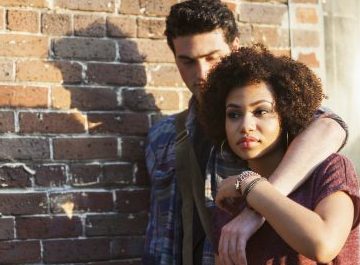Unhealthy or Abusive Relationships
Sadly, unhealthy or abusive relationships are common. A national survey found that almost 1 in 3 teens reported being verbally or psychologically abused, and 1 in 10 had been the victims of physical dating violence within the past year.
So how do you know if you’re in an unhealthy or abusive relationship? Don’t misinterpret anger, violence, or control as expressions of love. Even if your partner says they love you, that behavior is not healthy, and is unsafe.
Anyone can be a victim or perpetrator of abuse. However, young people of color or who are LGBTQ+, have a disability or are undocumented may be at particular risk. So are young people who have experienced or witnessed abuse at home, live in poverty, or are exposed to violence in their community.
Remember that no one is destined to be abused or to be abusive. You deserve a healthy, safe relationship. We talk more about communication, respect and how to keep relationships safe and healthy here.
What is abuse?
Abuse is a pattern of behavior where one partner gains power and control over the other. Abuse does NOT have to be physical. There are several kinds of abuse: physical abuse, sexual abuse, emotional abuse (sometimes called psychological or verbal abuse), stalking, reproductive coercion and financial abuse.
Getting in an occasional fight or feeling insecure sometimes is NOT the same as abuse. Abuse is a pattern where one partner has complete or almost complete control of the other person in the relationship.
How can you tell the difference between an unhealthy relationship and abuse?
There isn’t a clear line when a relationship becomes unhealthy or abusive. This means it might be hard to figure out what kind of relationship you’re in. Remember that abuse is all about power and control. An unhealthy relationship might involve a power imbalance, being mean, ignoring boundaries or pressuring one person to do things they aren’t comfortable with. In an abusive relationship, one partner has almost complete control of the other. Remember that no matter what, you deserve a relationship based on kindness and respect. You don’t need a reason to end a relationship.
Types of abuse
In unhealthy relationships, one partner tries to control and exert power over the other, physically, sexually and/or emotionally. Abuse is a pattern of behavior, meaning that it happens more than once. However, when a romantic partner does any one of these acts—even once—it’s still considered dating violence.
Physical abuse
- Hitting, slapping, shoving or punching
- Spitting
- Pinching
- Kicking
- Choking or strangling
- Throwing something at you
- Pulling your hair
- Causing any other kind of physical pain
Sexual abuse
- Any unwanted sexual touch, including kissing
- Rape or sexual assault
- Forcing, coercing or pressuring you into having sex or doing something sexual against your will or without your consent
- Pressuring you to have sex without condoms or other barrier methods
- Pressuring you to have sex or do something sexual at a time or in a place you do not want to
- Getting you drunk or giving you drugs before sex
Emotional, verbal and psychological abuse
- Jealousy: Your partner is extremely jealous. They get angry or resentful when you talk to someone else or hang out with someone besides them. They might demand access to your phone or social media accounts or frequently accuse you of flirting.
- Anger: Your partner picks fights with you, screams or yells at you, or calls you names. You feel like you have to change your behavior to avoid upsetting your partner.
- Dishonesty: Your partner lies to you, keeps information from you, or steals from you.
- Name-calling: Your partner calls you names, tells you you’re worthless, makes fun of you, or puts you down in other ways.
- Dependence: Your partner says that they can’t live without you and threatens to do something drastic (like hurt or kill themselves) if you end the relationship.
- Threats: Your partner threatens to hurt you or a pet, or to destroy something you own. They may also threaten to spread a rumor, tell a secret, or share nude or sexual photos or videos. They may threaten to kill or hurt themselves if you leave them. You may feel afraid, or like they’ll ruin your life if you don’t do what they say. In queer relationships, this might mean threatening to out you as LGBTQ+ to friends or family.
- Isolation: Your partner tries to keep you from seeing your friends or family. They might get angry or jealous when you spend time without them, guilt trip you into canceling plans, or try to convince you that your other relationships don’t matter. You and your partner spend almost all your time together, and you feel guilty when you’re apart.
- Lack of trust: Your partner asks for your passwords, demands access to your social media or phone, or wants to know where you are and what you’re doing at all times. They accuse you of hiding something or lying to them. You may feel guilty for wanting any privacy.
- Catfishing: Your partner pretends to be someone else online and flirts with you in order to “catch” you cheating.
- Denial: They may “gaslight” you by denying their actions, saying you remember something wrong, or minimizing the importance of something they did or said. Or, they may blame you for their actions.
Reproductive coercion
- Sabotaging or controlling your birth control, such as poking holes in condoms, flushing birth control pills down the toilet, or removing condoms during sex without your consent
- Forcing or pressuring you to have or not have an abortion
- Pressuring you into stopping birth control
- Forcing you to have unprotected sex
Financial abuse
- Preventing you from getting a job or sabotaging your work
- Keeping you from going to work (for example, by taking your car keys)
- Guilt tripping or coercing you into quitting your job
- Saying or doing something to make you get fired
- Taking or stealing your paycheck or student loan check
- Using your financial situation to control you (for example, if you are reliant on them for rent, food or other necessities, they may threaten to stop supporting you)
- Controlling how you spend your own money
Stalking
- Memorizing your schedule or following you and showing up where you are or they think you might be
- Sending unwanted or excessive flowers, letters or other gifts
- Tracking what you do online or who you call or text
- Extensively researching you on the internet
- Damaging or threatening your property or people you know
- Other behavior that makes you feel afraid or monitored
All of these are abusive behaviors. They are NEVER normal and no one EVER deserves them. You deserve a relationship based on kindness and respect.
I think I’m in an unhealthy or abusive relationship. What now?
Getting out of an abusive or unhealthy relationship can be scary and feel impossible. It’s great that you’re taking the first step of educating yourself and thinking about what to do next. You deserve to be treated with kindness and respect. Remember that you’re not alone.
- If you’re in immediate danger, call 911.
- Tell an adult you trust, like a school counselor, teacher, family member, religious leader, coach or healthcare provider about what’s going on. Choose someone you feel safe and comfortable with.
- If you go to the same school as your abuser, talk to a school counselor, teacher or professor, or other school official you trust. They can help you stay safe.
- If you’re not ready to tell someone, that’s ok. Think of who you can talk to when you feel ready. Consider calling or texting an anonymous hotline instead (see below).
- Whether you’re ready to talk to someone or not, make a safety plan. This is a personal, practical plan to help you stay safe, whether you’re still in the relationship, thinking about leaving, or have already left. Love is Respect has safety planning guides for high school and college students here.
- Remember to take care of yourself. You may be feeling scared, down, angry, hopeless, or many other things. Your emotions are valid.
What if my friend is in an unhealthy relationship?
Seeing someone you care about in pain can be hard. If you’ve noticed major changes in a friend or loved one since they’ve entered a new relationship, talk to them.
- Be supportive and non-judgmental. Let them know that you care about them and are there for them, no matter what.
- Tell them about changes in them you’ve noticed, like not hanging out with friends or no longer pursuing activities they used to enjoy.
- Ask them questions. Have they ever felt scared of their partner? How do they feel when their partner looks at their phone or yells at them?
- Make sure they understand that abusive behaviors are not normal, and not their fault.
- They may not be ready to leave the relationship. Remember that you can’t control their behavior. Let them know you’ll be there for support in the meantime, and when they are ready to leave.
- Connect them to resources. Give them one of the hotline numbers below, and links to more resources like the one you’re reading now.
- Offer to help them make a safety plan.
I think I might be abusive. What should I do?
First, it’s great that you’ve recognized your behavior as unhealthy. That can be incredibly difficult. We encourage you to learn more about healthy relationships and consent. Talk to an adult you trust about why you’re concerned. Call one of the hotlines below—they can connect you with resources and help you figure out next steps.
Resources
If you are in immediate danger, call 911.
If you’ve been sexually abused or assaulted, you can call the RAINN (Rape, Abuse & Incest National Network) hotline: 800-656-4673
Call the National Dating Abuse Helpline at 1-866-331-9474 or text “loveis” to 22522 to talk to a trained peer advocate. A service of Love is Respect, this national, 24-hour resource is specifically designed for teens and young adults.
The National Domestic Violence Hotline: 1-800-799-SAFE (7233) or 1-800-787-3224 (TTY)The Hotline is a nonprofit organization that provides crisis intervention, information, and referral to victims of domestic violence, perpetrators, friends and families.
Learn more about teen dating violence from Break the Cycle.
If you’re 10-26 years old and live in NYC, you can get free, confidential help at the Mount Sinai Adolescent Health Center by calling (212) 423-3000.
This information is not intended to provide medical advice, professional diagnosis, opinion, treatment or services, only general information for education purposes only.


